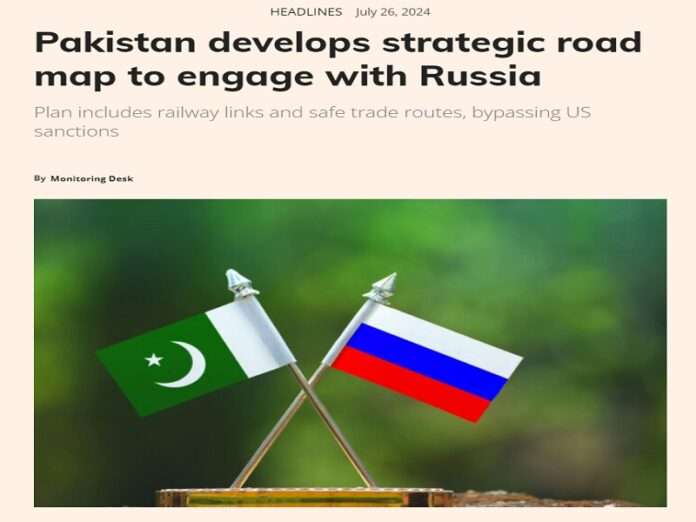Pakistan’s Express Tribune cited unnamed sources to report late last week that their country is preparing a three-pronged strategic roadmap for trade with Russia. It’ll include government-to-government projects, business-to-business cooperation, and mechanisms for ensuring sanctions-proof trade. Three rail lines are envisaged linking Pakistan with Russia via Afghanistan-Central Asia and Iran-Azerbaijan as well as bring to market a half-Canadian-owned copper-gold mine’s resources.
According to their report, other aspects include more agricultural imports from Russia, cooperation on hydroelectricity and other power-generating projects, and a new steel mill in Karachi. As for sanctions-proofing all of this, no designated companies will be involved and all transactions will be conducted in local currencies. Some barter might also play a role as well. Pakistan’s plans are ambitious, and it would be mutually beneficial if they’re implemented, but that can’t be taken for granted.
For starters, it was explained in early July that “Pakistan Remains Reluctant To Comprehensively Expand Ties With Russia” due to its political and military leaderships’ close ties with the US that are regularly leveraged behind the scenes to curtail its policymaking sovereignty. Its representatives talk a good talk and have strung Russia along for years in dead-end negotiations over a long-awaited strategic energy deal, but they haven’t yet put their money where their mouth is and actually agree to anything.
In fact, they don’t even have much money left to spend anyhow even if they wanted to since the country has been on the edge of bankruptcy for the last two years since its pro-US post-modern coup against former Prime Minister Khan, thus raising the question of where the requisite funds will come from. Russia already agreed to modernize one of the abovementioned rail routes but nothing has been done thus far, though admittedly lopsided arrangements could incentive it to agree to other projects.
Russia would happily agree to basement-bargain prices for minerals and stakes in hydroelectric projects, not to mention swapping agricultural products for them, but that wouldn’t be a fair deal for Pakistan. Any such move could trigger protests, plus it might cause problems in Pakistan’s ties with the US and China. Those two would wonder why they aren’t being given such preferential terms and could leverage their agents of influence in the country to obstruct deals with Russia and replace them with their own.
There’s also the challenge posed by Pakistan’s metastasizing terrorist threat as terrorist-designated Baloch insurgents increasingly coordinate with Afghan-based TTP terrorists. The first would violently object to any lopsided mineral deals in their home region and could attack rail routes to Iran while the second could impede progress on a trans-Afghan railway. Pakistan’s new counterterrorist operation also seems to be more about hype than anything else and thus likely won’t thwart these threats.
To review the obstacles that are in the way of these ambitious plans, they’re: Pakistan’s failure to liberate itself from the yoke of American vassalage; the lack of funds for financing these projects; American and Chinese jealousy if Pakistan gives preferential investment terms to Russia (let alone agrees to grossly lopsided barter arrangements); and worsening Baloch-TTP terrorist threats. Accordingly, some progress might be made on this strategic roadmap with time, but it’s unlikely that it’ll be implemented in full.







